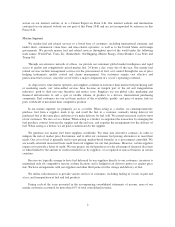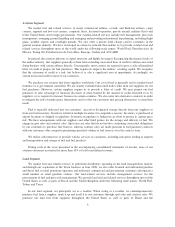World Fuel Services 2008 Annual Report Download - page 20
Download and view the complete annual report
Please find page 20 of the 2008 World Fuel Services annual report below. You can navigate through the pages in the report by either clicking on the pages listed below, or by using the keyword search tool below to find specific information within the annual report.• additional capital expenditure requirements;
• the risk that an acquisition or strategic investment could reduce our future earnings; and
• the assumption of material liabilities, exposure to unknown liabilities, and no or limited indemnities.
Changes in U.S. or foreign tax laws could adversely affect our business and future operating results.
We are affected by various U.S. and foreign taxes imposed on the purchase and sale of marine, aviation and
land fuel products. These taxes include sales, excise, GST, VAT, and other taxes. Changes in U.S. and foreign
tax laws or our failure to comply with those tax laws could adversely affect our business and operating results.
We face intense competition and, if we are not able to effectively compete in our markets, our revenues
and profits may decrease.
Competitive pressures in our markets could adversely affect our competitive position, leading to a possible
loss of market share or a decrease in prices, either of which could result in decreased revenues and profits. Our
competitors are numerous, ranging from large multinational corporations, which have significantly greater capital
resources, to relatively small and specialized firms. In addition to competing with fuel resellers, we also compete
with the major oil producers that market fuel directly to the large commercial airlines, shipping companies and
petroleum distributors operating in the land transportation market. Our business could be adversely affected
because of increased competition from the larger oil companies, who may choose to directly market to smaller
airlines, shipping companies and petroleum distributors operating in the land transportation market, or to provide
less advantageous price and credit terms to us than to our fuel reseller competitors.
If we fail to comply with environmental laws and government regulations, we could suffer penalties or
costs that could have a material adverse effect on our business.
We are required to comply with extensive and complex environmental laws and regulations at the
international, federal, state and local government levels relating to, among other things:
• the handling of fuel and fuel products;
• the operation of fuel storage and distribution facilities;
• workplace safety;
• fuel spillage or seepage;
• environmental damage; and
• hazardous waste disposal.
If we should fail to comply with these regulations, we could be subject to substantial fines or penalties and
to civil and criminal liability.
If we are involved in a spill, leak, fire, explosion or other accident involving hazardous substances or if
there are releases of fuel or fuel products we own, our operations could be disrupted and we could be subject to
material liabilities, such as the cost of investigating and remediating contaminated properties or claims by
customers, employees or others who may have been injured, or whose property may have been damaged. These
liabilities could have a material adverse effect on our business, financial condition and results of operations.
Some environmental laws impose strict liability, which means we could have liability without regard to whether
we were negligent or at fault.
12
























